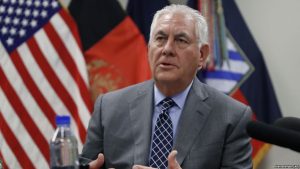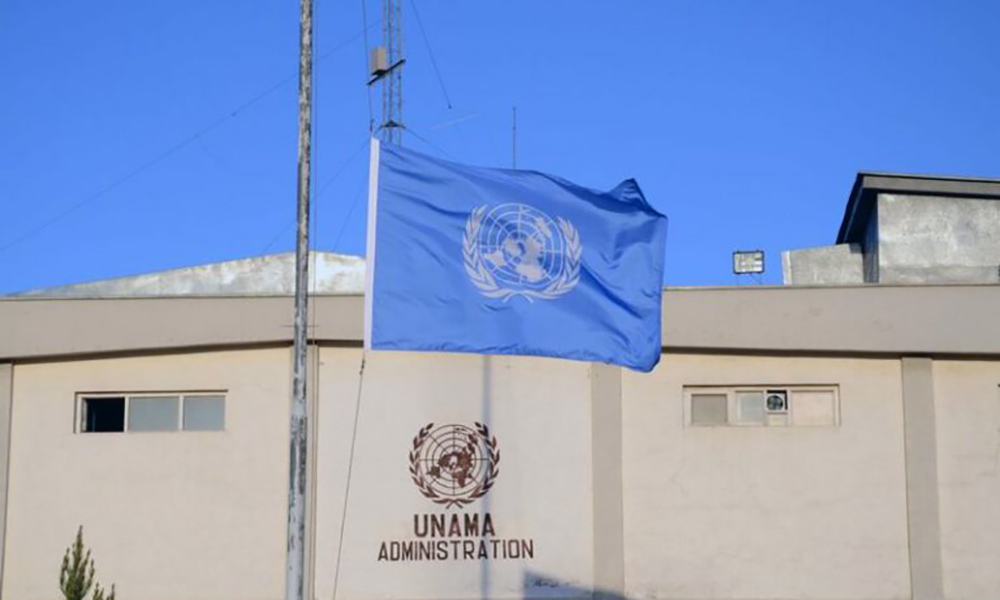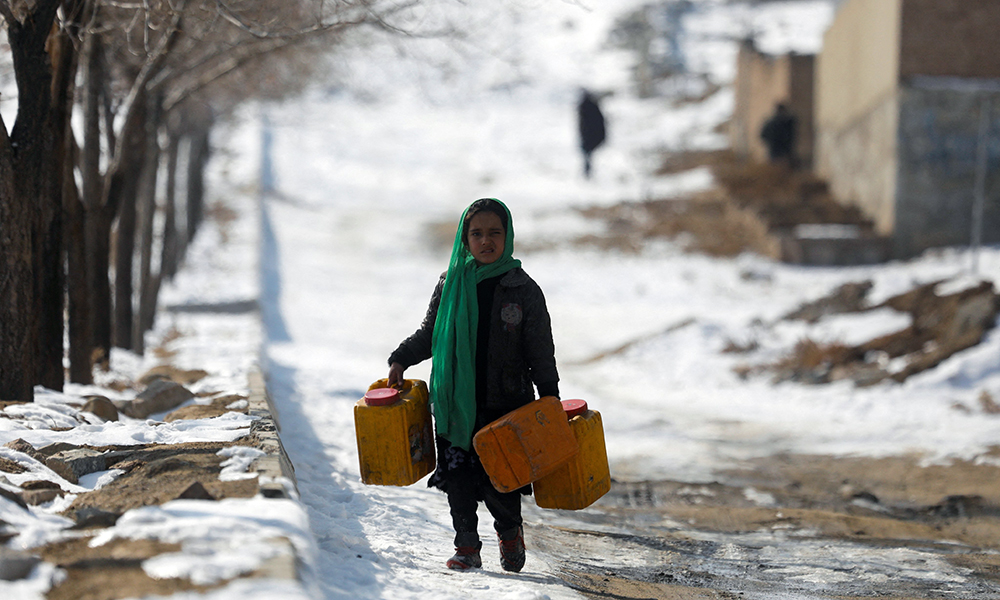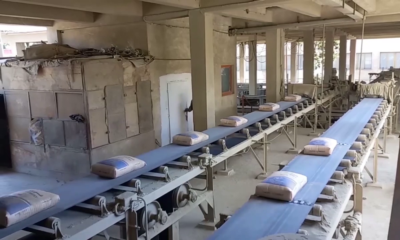Latest News
Tillerson Stressed on Taliban’s Defeat & Pakistan’s Action Against Terror Groups

 U.S. Secretary of State Rex Tillerson who made unannounced visit to Afghanistan outlined the Trump’s new strategy toward Afghanistan, emphasizing to continue war against Taliban and calling on Pakistan to change move against terrorist groups.
U.S. Secretary of State Rex Tillerson who made unannounced visit to Afghanistan outlined the Trump’s new strategy toward Afghanistan, emphasizing to continue war against Taliban and calling on Pakistan to change move against terrorist groups.
Tillerson spent almost three hours, most of the time in talks with President Ghani, Chief Executive Abdullah and other U.S. and Afghan officials about the U.S. strategy for ending America’s longest war and the reaffirm of the U.S.-Afghan commitment to achieving peace, stability and long-term prosperity.
Thillerson in his speech said there’s room for moderate members of the Taliban in Afghanistan’s government if they reject violence and terrorism and commit to stability.
”Clearly, we have to continue to fight against the Taliban, against others, in order for them to understand they will never win a military victory,” Tillerson said during an unannounced visit to Bagram Air Base in Afghanistan. “And there are, we believe, moderate voices among the Taliban, voices that do not want to continue to fight forever. They don’t want their children to fight forever. So we are looking to engage with those voices and have them engage in a reconciliation process leading to a peace process and their full involvement and participation in the government.”
There’s a place for those voices “if they are ready to come, renouncing terrorism, renouncing violence and being committed to a stable prosperous Afghanistan,” Tillerson said.
Unsurprisingly, Tillerson set his sights on Pakistan and said he would be flying to Pakistan on Tuesday to reinforce the Trump administration’s demand that Islamabad move against the Taliban and other extremists based inside its borders or face the consequences.
“We have made some very specific requests of Pakistan in order for them to take action to undermine the support the Taliban receives and other terrorist organizations receive,” he said.
U.S. policy toward Islamabad “will be based upon whether they take action that we feel is necessary to move the process forward for both creating opportunity for reconciliation and peace in Afghanistan but also ensuring a stable future for Pakistan,” he continued.
In the meantime, President Ghani has welcomed U.S. Secretary Tillerson and thanked U.S. support and declaring of the new US strategy by president Trump on Afghanistan and the South Asia.
The Chief Executive Dr. Abdullah Abdullah who was also present in the meeting said the regional countries should cooperate in bringing about economic relief and peace in the region.
Afghanistan visit was a part of Tillerson’s week-long trip to the Middle East, South Asia and Europe.

Latest News
Five dead, 24 injured in traffic accident in Samangan

The press office of Samangan Police Command says five people died and 24 others were injured in a traffic accident in Dara-e Suf Payeen district of the province.
Samangan Police Command said the incident took place on Thursday at 1:00am when a vehicle was traveling from Balkh province towards Dara-e Suf Payeen district.
Local officials stated that most of the injured were transferred to the Dara-e Suf Payeen district hospital, but three of them, who were in a serious condition, were taken to the Balkh Regional Hospital.
The cause of the accident was reportedly due to a technical problem with the vehicle.
Latest News
UNAMA issues latest rights report, notes ongoing challenges for women, girls and media

The Special Rapporteur on the human rights situation in Afghanistan, Richard Bennett, urged the United Nations Human Rights Council to keep Afghanistan and its people at the forefront of its agenda.
“It is important to hold the Taliban (Islamic Emirate) to account for their policies and actions,” he told the UN rights body this week.
Bennett’s account coincided with the UN mission in Afghanistan’s (UNAMA) latest report on the human rights situation – covering the period from January to March 2024.
In its report, UNAMA said that while the new school year in Afghanistan commenced in April, it did so without the presence of Afghan girls in high schools.
The report also stated that an invitation to attend a ceremony in Kabul marking the commencement of the new academic year, issued to media by the Ministry of Education, specifically instructed women journalists not to attend, citing a “lack of proper place[s]” for women.
UNAMA did however point out that while they still received reports of the enforcement of the hijab instruction,such incidents significantly decreased after January 2024 with the cessation of the large-scale enforcement actions which took place between December 2023 and January 2024.
On the issue of freedom of media, UNAMA said the situation for journalists was “mixed”.
“Some journalists have reported an improvement in access to information with the appointment of spokespersons for de facto line departments at provincial level and the establishment of WhatsApp groups by some de facto entities to distribute information.”
However, journalists and media workers continue to operate in a challenging environment, with the media facing significant financial challenges, in addition to a range of restrictions imposed by the Islamic Emirate and the risk of arbitrary detentions.
Between January and March, at least four journalists were arrested, including one from Japan’s Kyodo news agency. All have since been released.
UNAMA stated however that threats to former government officials and former ANDSF members, including arbitrary arrest and detention, torture and ill-treatment and extrajudicial killings, continue to be reported to UNAMA Human Rights, despite the general amnesty announced by the Islamic Emirate.
On the death penalty and corporal punishment, UNAMA reported that the Islamic Emirate carried out three public executions of individuals sentenced to the death penalty.
“In all three instances, the de facto authorities stated that the death penalty was implemented in accordance with a sentence upheld by three de facto Courts (District, Appeal and Supreme) and approval by the Taliban leader,” the report read.
In response to the UNAMA report, Zabihullah Mujahid, spokesman of the Islamic Emirate, said that no one’s rights have been lost in Afghanistan, but Sharia rights of men and women in Afghanistan are secured and people have access to their rights more so now than before.
Mujahid called the UNAMA report baseless and said the report was not accurate.
Regarding the arrests of former government officials, Mujahid says no one has been arrested and there are no documents in this regard.
“In general, UNAMA’s reports are always full of propaganda and are meant to destroy public minds, and they do not have any documents to prove their claims,” added Mujahid.
Latest News
Neglecting climate change in Afghanistan will be catastrophic: IEA

Afghanistan stands among the nations that continue to face devastating consequences of climate change, but despite this the country has had to endure blatant injustice on the part of the international community regarding this critical issue.
After the return to power of the Islamic Emirate, the international community not only imposed various sanctions, but approached the issue of climate change in Afghanistan from a political perspective.
Consequently, with the suspension of 32 environmental and climate change projects, restricting Afghanistan’s access to pledged financial resources, and the exclusion of Afghanistan from regional and international meetings and conferences on environmental and climate issues, there has been blatant injustice against the people of Afghanistan.
In an article published by the Islamic Emirate’s official al Emarah on Thursday, the Islamic Emirate stated that as the Earth’s temperature continues to rise, climate change poses a threat to all facets of human existence.
Pointing out that countries lacking in resources, including Afghanistan, face heightened vulnerability to the perils of climate change, as they lack the requisite means and infrastructure to effectively mitigate and manage its effects.
According to information from Afghanistan’s National Environmental Protection Agency (NEPA), temperatures in the southern regions of the country have increased by 2.4 degrees Celsius over the past century, Hindu Kush regions by 1 degree Celsius, central and northern highlands by 1.6 to 1.7 degrees Celsius, and eastern regions of Afghanistan by 0.6 degrees Celsius.
This has created numerous problems in urban and rural areas of Afghanistan, including increased poverty, migration, recurring droughts, floods, rising temperatures, destruction of farms and forests, food shortages, livestock deaths, and the emergence of various diseases.
“These can be identified as the undesirable consequences and impacts of climate change in Afghanistan,” the report read.
The continuation of this situation has severely affected not only the water, agriculture, livestock, forests, and grasslands sectors but also significantly impacted the social and economic lives of the people of Afghanistan, as well as health, energy, biodiversity, and ecosystems, al Emarah reported.
Despite the challenges and existing problems, officials at NEPA have made necessary efforts to manage the issue of climate change in Afghanistan utilizing available resources. Over the past three years, practical steps have been taken regarding drafting, revising, and amending laws, policies, regulations, and work plans, as well as project design.
Revision of environmental laws, national environmental policy, regulations on ozone-depleting substances, approval of the KIGALI Amendment to the Montreal Protocol 2020, and other related documents can be highlighted as prominent actions in the field of climate change mitigation.
Other steps have also been taken, including the prioritization of climate-compatible water and watershed projects, the restoration of degraded ecosystems, sustainable management plans for Nuristan National Park, sustainable forest and land management projects, and combating land degradation and biodiversity loss through enhancing sustainable food systems in Afghanistan.
The Islamic Emirate, under its environmental protection policy for Afghanistan, has placed climate change management at the forefront of its work priorities and has initiated efforts to mitigate the situation with the resources at hand.
With ensuring security nationwide, the Islamic Emirate has provided a conducive environment for implementing projects in various sectors across Afghanistan.
As climate change is an overarching issue, tackling the challenges and risks it poses requires joint efforts from all governments and collaboration among all stakeholders.
In light of this, the international community, nations, and pertinent organizations ought to prioritize environmental and climate change matters in Afghanistan. They should take practical and genuine steps by resuming suspended environmental and climate change projects, facilitating access to pledged financial resources, and creating opportunities for active Afghan participation in regional and international forums and conferences, al Emarah reported.
“Moreover, throughout this period, the people of Afghanistan have been directly impacted by the consequences of climate change, enduring significant financial and human losses.
“Therefore, the global community and pertinent organizations must extricate the environmental issue and climate change in Afghanistan from political spheres, conceiving it instead as a human dilemma,” the report read.
-

 Sport5 days ago
Sport5 days agoAfghanistan qualify for FIFA Futsal World Cup for first time ever
-

 Sport2 days ago
Sport2 days agoAfghanistan announce T20 World Cup 2024 squad
-

 Latest News5 days ago
Latest News5 days agoTurkmenistan committed to complete TAPI energy project
-

 Sport5 days ago
Sport5 days agoACL: Mawj Sahil 2-1 Sarsabz Yashlar; Sorkh Poshan 6-0 Maiwand
-

 Sport4 days ago
Sport4 days agoKohli slams strike-rate talk and pundits ‘from the box’
-

 World5 days ago
World5 days agoPolice arrest scores of pro-Palestinian protesters on US university campuses
-

 Regional5 days ago
Regional5 days agoIraq criminalises same-sex relationships with maximum 15 years in prison
-

 Latest News4 days ago
Latest News4 days agoGhori State Cement in Baghlan increases production














